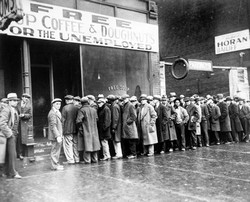A long-term look at the Great Depression
Lessons of the Great Depression are important for policymakers today. Yet, economic literature on the Great Depression has focused primarily on the macroeconomic policies that led to it without sufficient knowledge on the commodity market disintegration during that period. Little is also known about the causes of the slump in trade, the role of protectionism and the consequences of interwar protection. TRADEDEPRESSION (Trade and the Great Depression in a long run perspective) was an EU-funded project that has created a database of both the Great Depression and the economic crisis of 2008. As such, it explored the short-run interrelationships among output and employment, trade and trade policy during the Great Depression. Bilateral trade flows between countries were collected at the commodity level. This allowed for exploration of the impact of trade policies on the structure of trade flows. The researchers also collected both country and commodity-level information on trade policies such as tariffs. Furthermore, they amassed monthly bilateral trade data to be matched with economic and financial variables. Preliminary analysis suggested that trade policy had a more significant effect on United Kingdom trade flows than originally thought. Later work was set to replicate the analysis for the United States and other countries and to analyse the cross-country data set in its entirety. The spread of modern industry to the global periphery was also examined. TRADEDEPRESSION showed that industrial growth of this nature accelerated during the interwar period. Yet, the roots of modern industrial growth go as far back as the 19th century. The impact of policies varied greatly across countries depending on available resources. An upcoming book based on country and region studies will provide a closer look at this issue. Additionally, the study examined the impact of the Great Depression on domestic politics. Results show that extended periods of recession played a significant role in boosting right-wing extremists during the Great Depression. This work will be useful in political, economic and geopolitical studies.







